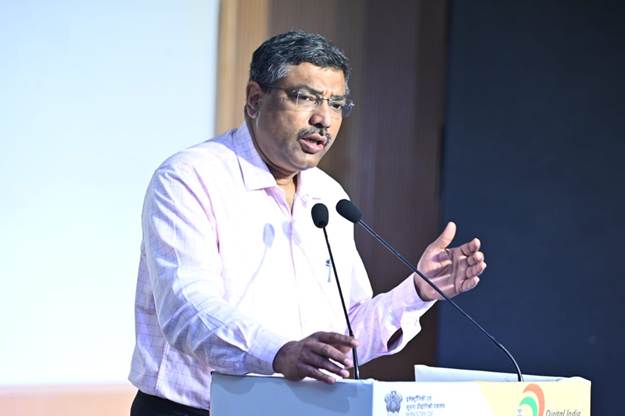New Delhi, October 07, 2025: The Ministry of Electronics and Information Technology (MeitY) today organised a workshop on Management of Information on Intermediary Platforms at New Delhi to sensitise participants on key provisions of the IT Act, 2000, and IT Rules, 2021, particularly Sections 69A and 79(3)(b), and Rule 3(1)(d), and to promote a clear understanding of their application in ensuring responsible digital governance and effective content management.
With the rapid growth of digital platforms, there has been a surge in unlawful information on IT intermediaries and social media platforms, violating various legal provisions, sources in Ministry of Electronics & IT said.
To curb this unlawful information, Section 79(3)(b) of the IT Act, 2000 read along with Rule 3(1)(d) of the IT Rules 2021 empowers the concerned Ministries, Departments, and State/UT to send notices to IT intermediaries to remove or disable the access of such information.
Addressing the event, Secretary Ministry of Electronics and Information Technology S. Krishnan elaborated on the scope and intent of Sections 69A and 79(3)(b) of the IT Act.

He explained that Section 69A empowers the Government, in its executive capacity, to block online content in cases where it threatens national security, public order or friendly relations with foreign States. Section 79, on the other hand, places intermediaries on notice regarding their obligations and potential liability in case of non-compliance, while final adjudication rests with the judiciary.
He also stressed upon the need for a suitable format; notices under Section 79(3)(b) containing directions/orders similar to Section 69A must be carefully avoided as the scope of both the provisions are entirely different. The language must be clear coupled with relevant legal provisions.
He added that the appropriate Government or its agency, as custodians of power, must exercise the powers cautiously. In other words, the powers must be exercised in a prudent manner so that they withstand the judicial scrutiny and also balance the fundamental rights guaranteed under the Constitution of India.
In his welcome address, Joint Secretary (Cyber Laws) Ajit Kumar highlighted the increasing challenges arising from fake news, misinformation, and the misuse of information technology.
He noted that deficiencies in notices often lead to judicial challenges, underscoring the need for a comprehensive and standardised approach while drafting them.
The workshop also sought to bring about a consensus among Government Departments on adopting a standardised format for drafting qualitative notices, thereby ensuring greater clarity, consistency, and effectiveness in implementation.
The event brought together subject matter experts from Indian Crime Coordination Centre (I4C); Department of Legal Affairs (DoLA); Indian Army; MeitY and representatives from various Ministries and Government Departments. The Government called upon all stakeholders to follow standardised practices and include essential elements in notices to promote clarity, consistency, and effective implementation.
More Stories
Paddy procurement accelerates, Token Tuhar Hath app simplifies procurement process
The procurement of paddy from farmers at the support price continues uninterrupted in all districts of Chhattisgarh.
Historic Implementation of Labour Reforms Under the Leadership of Prime Minister Narendra Modi: Chief Minister Sai
Chhattisgarh Chief Minister Vishnu Dev Sai today praised the leadership of Prime Minister Narendra Modi and Union Labour and Employment Minister Dr. Mansukh Mandaviya for the “historic” implementation of four labour codes in the country.
Digitization of over 6.5 million forms completed in the Special Intensive Revision (SIR) campaign
The Special Intensive Revision (SIR) of voter lists is underway in Chhattisgarh in full swing.
Chief Minister Sai presents Bastar Art statue of Birsa Munda to President Murmu
An inspiring and solemn moment was witnessed at a function held in Ambikapur on the occasion of Janjatiya Gaurav Diwas (Tribal Pride Day), when Chief Minister Vishnu Dev Sai presented a memento to President Droupadi Murmu, a statue of Dharti Aba Bhagwan Birsa Munda, created in Bastar Art.
Tribals getting new opportunities for education, livelihood, health and development: President Droupadi Murmu
President Droupadi Murmu today described the Central Government’s ‘Adi Karmayogi Abhiyan’, ‘Dharti Aba Janjati Gram Utkarsh Abhiyan’, and ‘Pradhan Mantri Janman Abhiyan’ as important steps for the upliftment of tribal society.
CM Sai, Union Minister Chouhan Release ChhattisKala Brand
With the aim of providing a single identity and a unified market platform for quality products, Chhattisgarh Chief Minister Vishnu Dev Sai and Union Agriculture and Rural Development Minister Shivraj Singh Chouhan today launched the much-awaited unified state brand, ChhattisKala, at the Dhamtari district headquarters.


